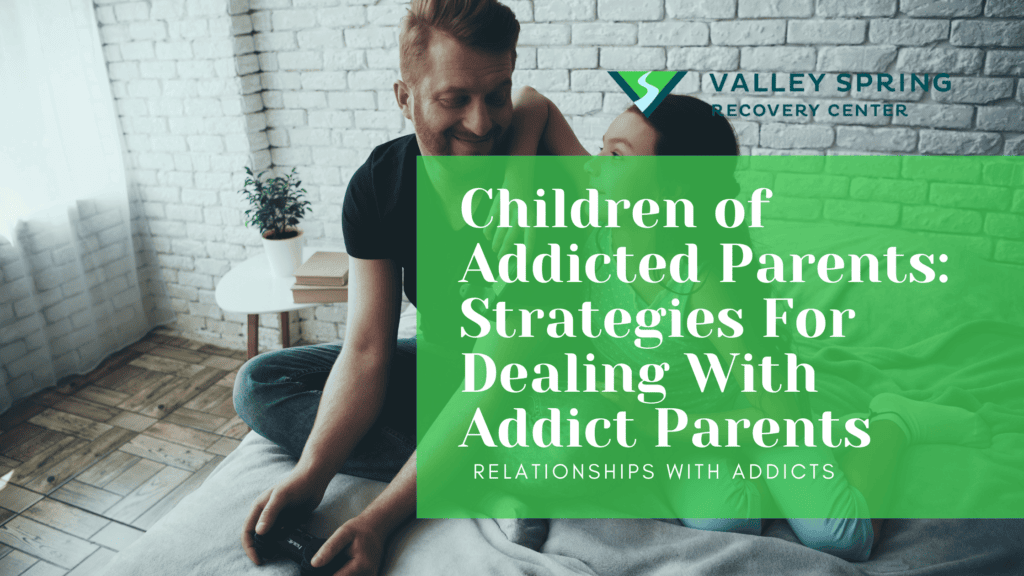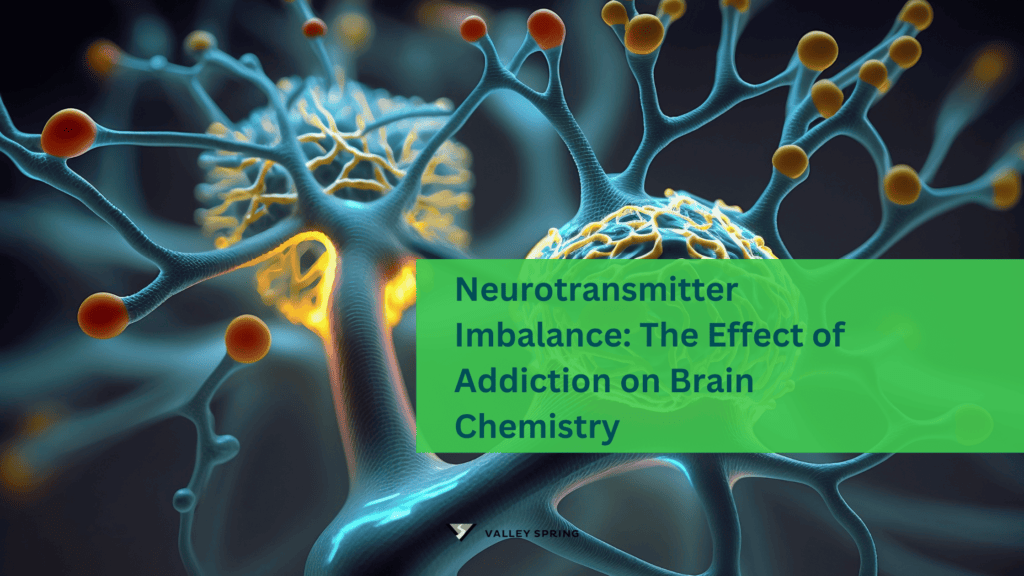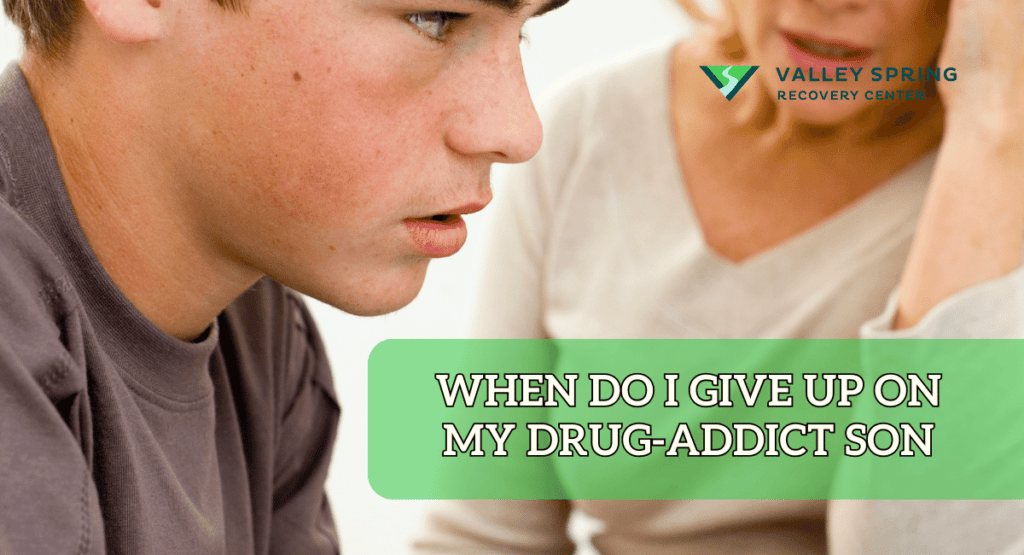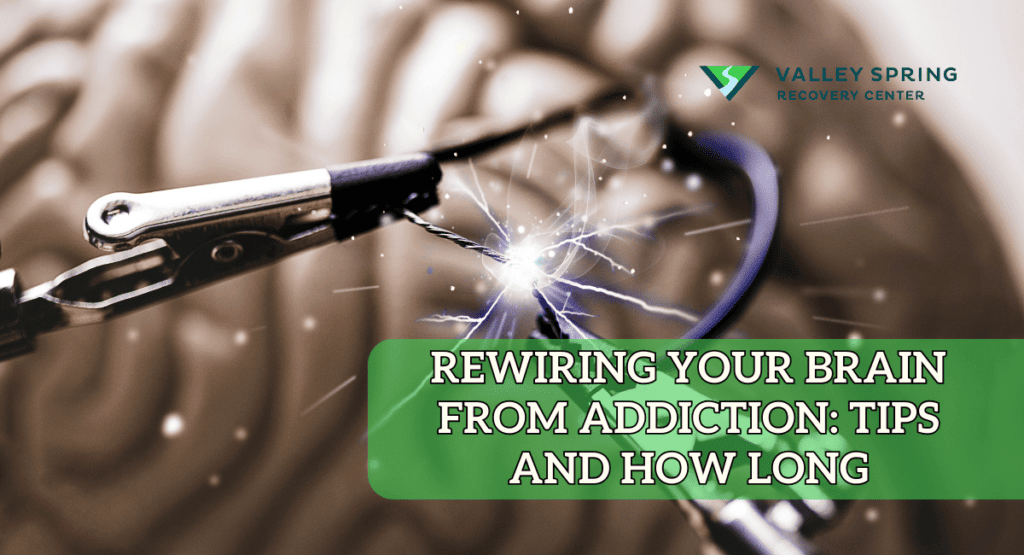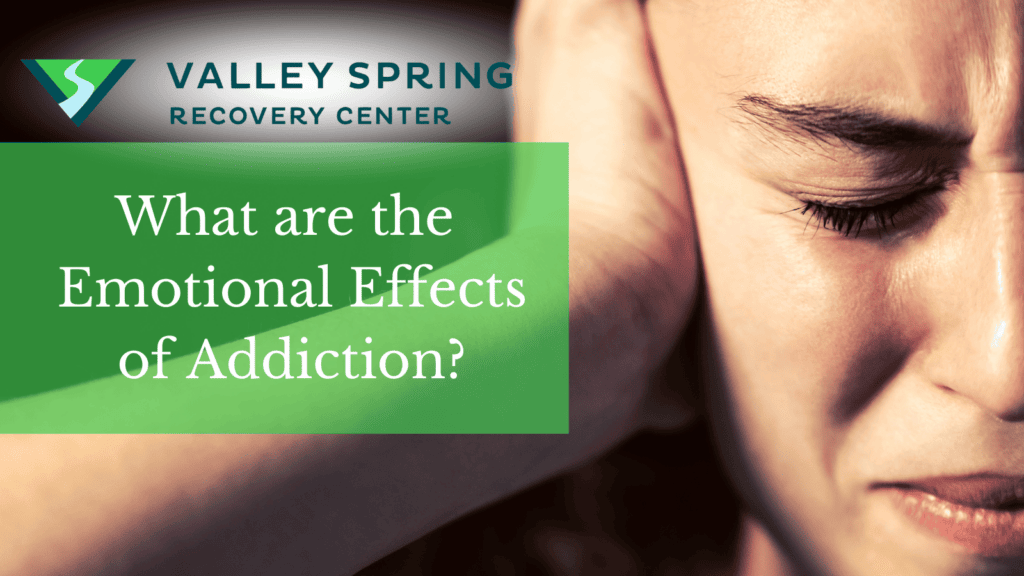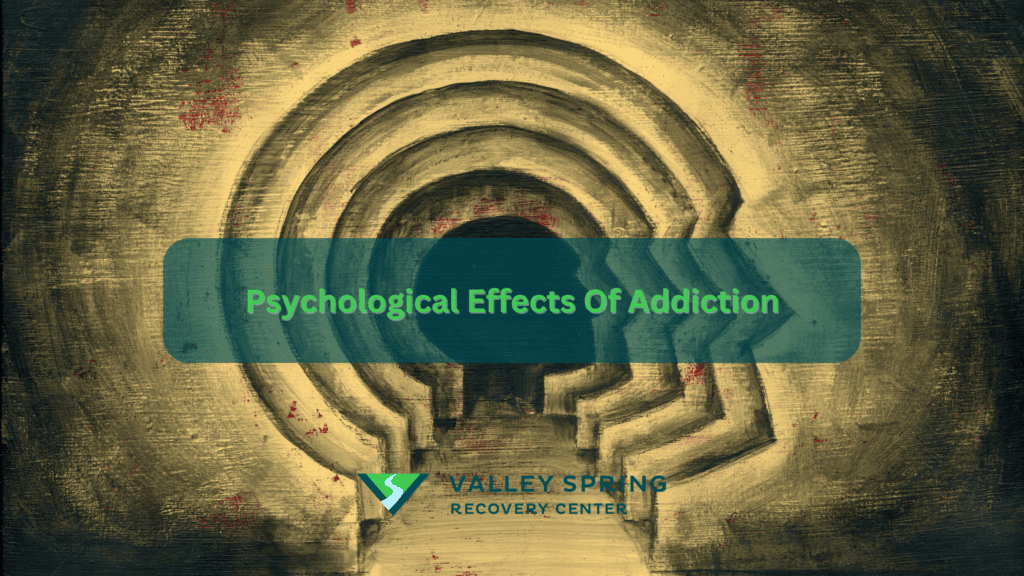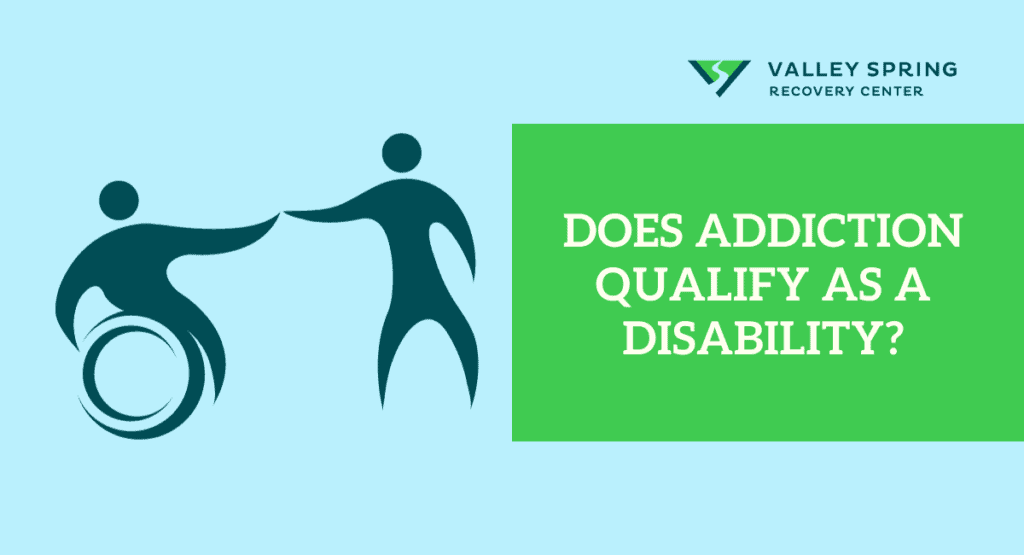Addiction affects not only the individuals trapped in its clutches but also leaves an indelible mark on their families, particularly their children. According to the Substance Abuse and Mental Health Services Administration (SAMHSA), over 8.7 million children in the United States live in households where at least one parent grapples with a substance use disorder.
Parents that have a chronic and relapsing disorder characterized by the compulsive seeking and use of substances despite harmful consequences have a long-lasting negative effect on their children. For the children of addicted parents, this means being exposed to an environment marked by instability, unpredictability, and neglect.
The parental focus on obtaining and using substances can lead to emotional and physical neglect, creating an atmosphere where the demands of the addiction may overshadow the child’s emotional needs. As a result, these children often face challenges in their emotional development, interpersonal relationships, and overall well-being, shaping their experiences long into adulthood.
What Are The Effects of Parental Substance Abuse On Children?
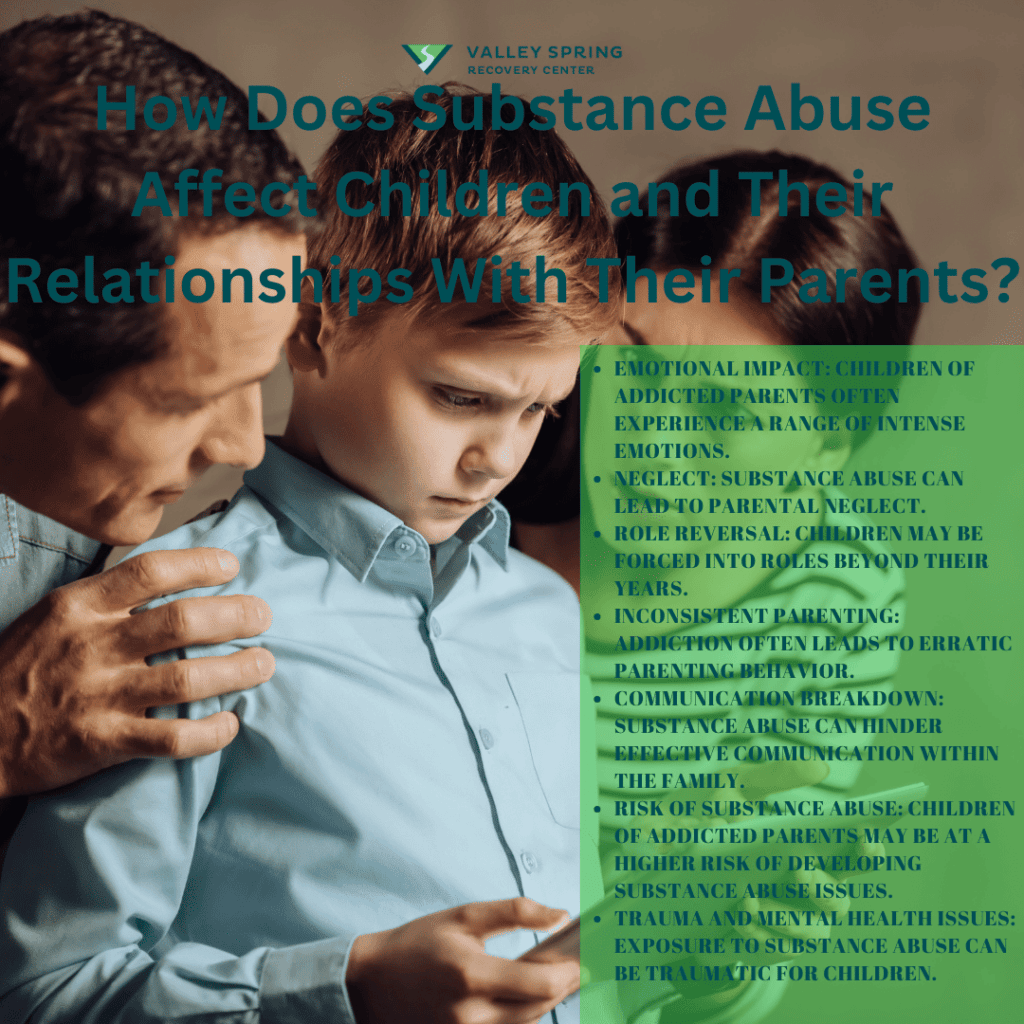
Growing up with a parent who struggles with substance abuse has profound and long-lasting effects on a child’s emotional well-being, development, and relationships. Research indicates that children exposed to parental substance abuse face an increased likelihood of emotional instability, neglect, and developmental delays, including speech impairments, malnutrition, and cognitive issues according to a 2013 study in the National Library of Medicine by Lander et al. These children often experience a range of intense emotions such as anxiety, fear, guilt, and shame due to the unpredictable and often erratic behavior of the addicted parent. This can lead to emotional unpredictability within the home and a breakdown in family communication.
Furthermore, the situation often forces children into inappropriate roles, such as caretaking for younger siblings or even for the addicted parent themselves, which can severely hinder their own emotional and social development. Parental substance abuse during pregnancy can also lead to severe birth defects and attachment problems in newborns, impacting the child’s health and ability to function right from birth. Additionally, children in these environments are three times more likely to suffer physical, sexual, and emotional abuse and four times as likely to experience neglect compared to their peers in non-substance-abusing homes as referenced in the Child Welfare Information Gateway.
The neglect children experience often manifests as a lack of basic care, with their emotional and physical needs consistently unmet. This neglect not only affects their current state but also compromises their ability to form healthy attachments and relationships in the future. Living in a household where substance abuse is prevalent teaches children that their needs are not a priority, and this belief can have devastating effects on their self-esteem and mental health, often leading to behavioral issues like angry outbursts, depression, anxiety, or detachment.
The cyclical nature of addiction, reinforced by the parents’ feelings of guilt and shame, exacerbates the situation, as these emotions often lead to further substance use to cope, perpetuating the problem. Unfortunately, this cycle makes it difficult for parents to break free from substance abuse, further entrenching the family in a destructive pattern that can continue across generations.
What Are Signs Of Role Reversal In Children Experiencing Parental Substance Use Disorder?
Signs of role reversal in adult children of addicted parents manifest through an overdeveloped sense of responsibility, difficulty setting boundaries, and a constant quest for approval and validation. Chronic self-neglect may occur as they prioritize others over their well-being, coupled with a reluctance to engage in conflicts to maintain harmony. Perfectionism often surfaces as a coping mechanism for the unpredictability of life with addicted parents, and expressing personal needs becomes challenging. These individuals may automatically assume caretaker roles in relationships, harbor a fear of abandonment, and grapple with persistent feelings of guilt, even when undeserved, reflecting the lasting impact of their upbringing.
What Should You Do If You Were Affected by Parental Addiction as a Child and Now Struggle with Substance Use Disorder as an Adult?
If you find yourself struggling with substance use disorder as an adult, a condition that may stem from exposure to addiction in your childhood, it is crucial to seek professional help. The Substance Abuse and Mental Health Services Administration (SAMHSA) emphasizes the importance of addressing both the emotional trauma of your childhood experiences and your current substance use issues through integrated treatment (SAMHSA, 2021). This approach typically includes a combination of therapy, medication, and support groups, tailored to address the specific complexities of your situation.
Therapy can help unpack the impact of your early exposure to addiction, aiding in understanding how these experiences may have predisposed you to substance use. Cognitive-behavioral therapy (CBT) is particularly effective in treating substance use disorders and can help you develop healthier coping mechanisms and strategies to manage stress and emotions. Additionally, support groups like Adult Children of Alcoholics (ACA) or Al-Anon can provide a community of individuals who understand your experiences and can offer support and guidance.
Moreover, consider a treatment program that specializes in dual diagnosis or co-occurring disorders if you are dealing with additional mental health issues such as depression or anxiety. These programs are designed to treat both substance use disorders and mental health conditions concurrently, providing comprehensive care that addresses the root causes of addiction.
It’s important to remember that recovery is a journey, and reaching out for help is a vital first step. By seeking support and treatment, you can begin to heal the wounds of the past and work towards a healthier, substance-free future.
How Can I Deal With The Guilt And Shame Resulting From Addicted Parents?
Dealing with the guilt and shame resulting from having addicted parents requires a multifaceted approach. Seek professional support through therapy, practice self-compassion by recognizing that their addiction is beyond your control, and educate yourself about the nature of addiction. Set healthy boundaries, connect with others who share similar experiences, and consider forgiveness a personal journey toward emotional freedom. Focus on personal growth, engage in self-improvement activities, and use mindfulness techniques to stay grounded. Remember, healing is a gradual process, and seeking help is a sign of strength as you work towards freeing yourself from unnecessary guilt and shame.
What Strategies Can Children of Addicted Parents Employ To Mitigate Negative Effects?
Children of addicted parents often face unique challenges as they navigate the lingering effects of their upbringing. Implementing the following practical strategies is crucial for fostering emotional resilience and personal growth:
- Seek Professional Support: Therapy, counseling, or support groups can provide a safe space for adult children to explore and process their emotions, develop coping mechanisms, and gain insights into their experiences.There are government agencies like the department of children and family services that can help to support you if you are under the age of 18 years old.
- Establish Healthy Boundaries: Setting clear boundaries is crucial for self-preservation. This involves recognizing and communicating limits regarding the level of involvement with the addicted parent and establishing boundaries that protect one’s emotional well-being.
- Foster Self-Awareness: Reflecting on the impact of parental substance abuse and developing self-awareness can empower adult children to understand their emotions, behaviors, and patterns of thinking. This self-awareness is foundational for personal growth and breaking generational cycles.
- Build a Support Network: Surrounding oneself with a supportive network of friends, family, or individuals who have experienced similar challenges can provide a sense of belonging and understanding. This network can offer emotional support and validation.
- Practice Self-Care: Prioritizing self-care is essential for mental and emotional well-being. This can include exercise, mindfulness, hobbies, and adequate rest. Taking care of one’s physical and emotional health is a vital aspect of the coping process.
- Educate Yourself: Learning about addiction, its effects, and recovery processes can help adult children make sense of their experiences. It also provides insight into their parents’ challenges, fostering empathy and understanding. Addiction is a disease and just because a parental figure is addicted to drugs and or alcohol, doesn’t mean they don’t love you.
- Break the Stigma: Overcoming the stigma associated with parental substance abuse is crucial. Acknowledging that addiction is a complex issue and seeking help does not reflect weakness but strength in addressing and overcoming challenges.
- Set Realistic Expectations: Acceptance plays a crucial role in coping. It’s essential to set realistic expectations for oneself and the relationship with the addicted parent. Recognizing that change may be gradual helps manage expectations and reduce potential disappointment.
- Explore Creative Outlets: Engaging in creative pursuits, such as art, writing, or music, can provide a therapeutic outlet for expressing emotions and processing experiences that may be difficult to articulate verbally.
- Embrace Resilience: Recognize and celebrate personal strengths and resilience. Focus on personal growth and overcoming challenges, emphasizing the capacity to build a fulfilling and meaningful life despite past difficulties.
Navigating the effects of parental substance abuse requires time, patience, and a commitment to personal well-being. Seeking professional help and building a solid support system are essential steps toward healing and breaking the cycle of addiction’s impact on future generations.
Is It Possible To Help An Addicted Parent in a Healthy Way?
Yes, but keep in mind that supporting an addicted parent as an adult child involves a delicate balance between compassion and self-care. One significant way to help is by encouraging your parent to seek professional assistance. Suggest therapy, counseling, or rehabilitation programs to address the underlying issues contributing to their addiction. Emotional support is equally important; let your parent know you care about their well-being and are there for them without judgment. Educating yourself about addiction can foster empathy and understanding, enabling you to approach the situation with greater insight. However, it’s crucial to establish healthy boundaries to protect your well-being and avoid enabling destructive behaviors.
Participating in family therapy, if available, can be beneficial for addressing the impact of addiction on the family unit and fostering open communication. Creating a supportive environment by minimizing triggers and stressors is vital to encouraging recovery. While exploring intervention options, be prepared for resistance, as addiction often involves denial and reluctance to change. Patience is essential, recognizing that acceptance of help may take time.
Promoting long-term recovery involves supporting your parent’s commitment to ongoing treatment, participation in support groups, and the development of coping mechanisms to prevent relapse. However, it’s crucial to acknowledge that the responsibility for recovery ultimately lies with the addicted individual. Adult children cannot force someone into rehab; in some cases, professional intervention may be necessary. Self-care remains paramount for adult children navigating the complexities of dealing with an addicted parent, emphasizing the importance of seeking support for themselves throughout the process.
Can Adult Children Force Their Addicted Parent Into Rehab?
Adult children cannot force their addicted parents into rehab against their will. In most cases, individuals have the right to make decisions about their medical treatment, including entering or refusing addiction treatment.
However, there are certain situations where legal intervention may be possible. Depending on the jurisdiction, specific legal mechanisms such as involuntary commitment or guardianship may be available in extreme cases where the addicted parent poses a severe risk to themselves or others. These legal processes typically involve court proceedings and require substantial evidence to demonstrate the necessity of intervention.
While the desire to help an addicted parent is understandable, it’s essential to approach the situation with sensitivity and respect for the individual’s autonomy. Encouraging open communication, expressing concerns, and providing information about available treatment options may be more productive than attempting to force someone into rehab. In many cases, an addicted individual is more likely to engage in recovery voluntarily when they feel supported and empowered to make positive choices for themselves. If the situation is challenging, seeking guidance from a professional interventionist or addiction counselor can offer assistance in navigating these complex dynamics.
What Are Examples Of Establishing Healthy Boundaries In Your Relationship With Your Addicted Parent?
Below are 10 circumstances and examples of setting healthy boundaries in your relationship with your addicted parent:
- Define Clear Communication Limits: Establish boundaries around communication, specifying times and methods that are suitable for discussions about your parent’s addiction or related issues. This helps prevent these conversations from becoming overwhelming or intrusive.
- Limit Financial Involvement: Clearly define financial boundaries to avoid enabling addictive behaviors. Be cautious about providing financial support that could potentially be misused for substance abuse.
- Protect Your Emotional Space: Set limits on the emotional support you provide. While being empathetic, ensure you don’t compromise your mental health by taking on excessive emotional burdens or becoming a constant source of emotional reassurance.
- Establish Time Boundaries: Allocate specific times for interactions, allowing you to balance your commitment to your parent with other aspects of your life. This prevents the relationship from becoming all-consuming and helps maintain a healthy balance.
- Avoid Enabling Behaviors: Identify and avoid behaviors that may inadvertently enable the addiction. This might include covering up for your parent, making excuses, or tolerating unacceptable behavior without consequences.
- Prioritize Your Well-being: Make your well-being a priority. Set boundaries that protect your physical and mental health, and be prepared to distance yourself when necessary for your safety and stability.
- Clarify Expectations: Communicate your expectations regarding your parent’s behavior and adherence to agreed-upon boundaries. Consistently reinforce these expectations to maintain a sense of accountability.
- Seek Support for Yourself: Establish a support network that includes friends, family, or support groups. Having a solid support system can provide emotional reinforcement and guidance as you navigate your relationship with your addicted parent.
- Limit Exposure to Substance Use: If your parent is actively using substances, establish boundaries to limit your exposure. This might involve not being present during drug or alcohol use and avoiding environments where substance use is prevalent.
- Encourage Professional Help: Set a boundary around seeking professional help. Encourage your parent to engage with addiction specialists, therapists, or support groups to address the root causes of their addiction and work towards recovery.
Establishing healthy boundaries with an addicted parent, it’s crucial to prioritize your well-being and maintain a balance between empathy and self-preservation. Clearly defining communication limits, financial boundaries, and emotional space helps create a supportive yet manageable relationship. Avoiding enabling behaviors, setting expectations, and seeking support for yourself contribute to a healthier dynamic. Remember, the goal is not to force change but to foster an environment encourages your parent to take responsibility for their actions and seek help. Establishing these boundaries allows you to navigate the complexities of the relationship while preserving your own stability and personal growth.
Am I Enabling My Parent’s Addiction?
You may be enabled if you find yourself providing financial support without clear guidelines, making excuses for their behavior, or taking on responsibilities they should manage independently. Ignoring or downplaying their substance use, lacking clear boundaries, and rescuing them from consequences can also contribute to enabling behavior. Providing emotional support without encouraging accountability and sacrificing your well-being are additional signs. Acknowledging these patterns is a crucial step toward breaking the cycle of enabling and seeking help for yourself and your parent to foster a healthier dynamic.
How Do I Set Boundaries with My Addicted Parent Without Feeling Guilty?
Setting boundaries with an addicted parent requires clarity and assertiveness. Define your boundaries explicitly, whether they involve financial support, emotional involvement, or time commitments. Communicate your needs using “I” statements, expressing your feelings without assigning blame. Remember that establishing boundaries is a necessary act of self-care, and prioritizing your well-being does not equate to neglect or abandonment. Allow yourself to let go of guilt by recognizing that your boundaries are essential for maintaining a healthy and sustainable relationship with your parent while preserving your own mental and emotional health.
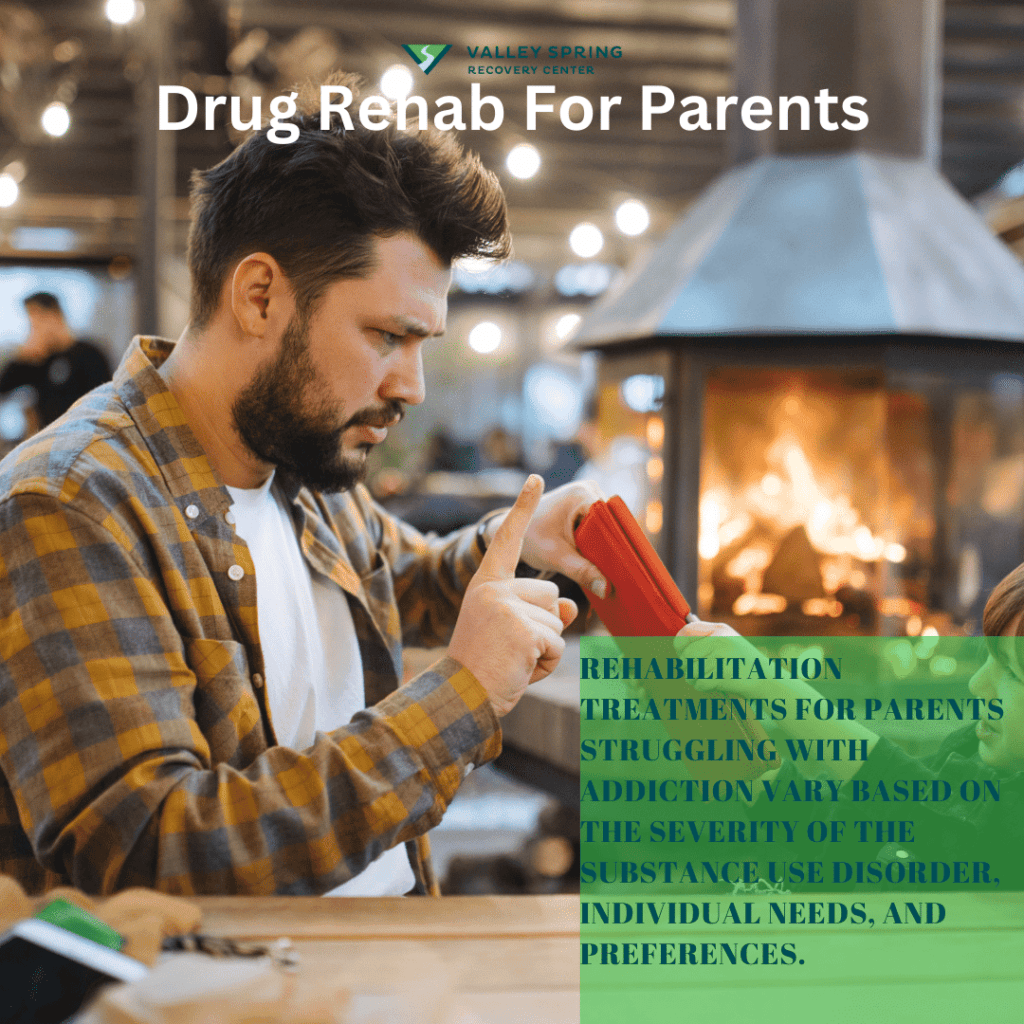
What Are The Types of Rehab Treatment for Parents?
Rehabilitation treatments for parents struggling with addiction vary based on the severity of the substance use disorder, individual needs, and preferences. Here are some common types of rehab treatments:
- Inpatient Rehabilitation (Residential Treatment): Inpatient rehab involves staying at a facility for a period, typically 28 to 90 days. This immersive environment provides intensive therapy, counseling, and support, removing individuals from the triggers of their daily lives.
- Outpatient Rehabilitation: Outpatient programs allow parents to receive treatment while living at home. These programs offer flexibility, allowing individuals to maintain work and family responsibilities. Outpatient treatment includes counseling, group therapy, and educational sessions.
- Intensive Outpatient Programs (IOP): IOPs provide a higher level of care than standard outpatient programs. Participants attend multiple weekly sessions, receiving a more concentrated and comprehensive treatment plan without needing residential accommodation.
- Partial Hospitalization Program (PHP): PHPs offer a structured and supportive environment during the day, with individuals returning home in the evenings. These programs are suitable for those who require intensive treatment but do not need 24-hour supervision.
- Dual Diagnosis Treatment: For parents with co-occurring mental health issues and substance use disorders, dual diagnosis programs address both aspects simultaneously, promoting comprehensive recovery.
- Medication-Assisted Treatment (MAT): MAT combines medication with counseling and behavioral therapies to address substance use disorders. Medications like methadone, buprenorphine, or naltrexone may be prescribed to assist in managing cravings and withdrawal symptoms.
- Therapeutic Communities: Long-term residential programs focus on rebuilding social skills, responsibility, and accountability. Participants often engage in group activities, counseling, and peer support.
- Holistic and Alternative Therapies: Some rehab programs incorporate holistic approaches, such as yoga, meditation, art therapy, and acupuncture, to complement traditional treatment methods and address the overall well-being of individuals.
- Family Therapy: Recognizing the impact of addiction on family dynamics, family therapy involves the entire family in the treatment process. It addresses communication, and codependency, and helps the family support the individual’s recovery.
- Aftercare and Continuing Support: Successful rehab often includes aftercare plans, such as ongoing therapy, support groups, and follow-up care. Continuing support is crucial for maintaining recovery once formal treatment concludes.
Choosing the most suitable type of rehab treatment depends on the individual’s specific needs, the nature of their addiction, and any co-occurring conditions. Parents and their families need to work with healthcare professionals to determine the most effective and personalized approach to recovery.
What Happens After Rehab When My Parent Comes Home?
Parents who have completed a rehabilitation program may undergo a spectrum of emotions, ranging from gratitude and joy to feelings of depression, anxiety, and anger. Children must recognize that these emotional reactions are entirely normal and can be effectively managed with the assistance of professional therapists or support groups.
In the months following rehabilitation, it becomes increasingly essential for young individuals to establish their support networks, comprising therapists, friends, and sober family members. This network aids in comprehending the dynamics of addiction and recovery, preparing them for potential changes in their parents’ behavior post-rehab. Sobriety is a complex journey, and children may encounter surprises or uncertainties regarding their parents’ newfound behaviors.
Are You Responsible For Your Parent’s Addiction?
No, as an individual, you are not responsible for your parent’s addiction. Addiction is a complex and multifaceted condition influenced by various factors, including genetic predisposition, environmental factors, mental health, and personal choices. While familial and environmental factors can contribute to the development of addiction, it is essential to understand that you do not control or cause your parent’s substance use disorder.
Blaming oneself for a loved one’s addiction can be emotionally burdensome and counterproductive. Instead, it’s crucial to focus on supporting your parent while caring for your well-being and seeking guidance from professionals or support networks. Addiction is a complex health issue that requires understanding, empathy, and appropriate interventions to foster recovery.
Is It Too Late To Help My Addicted Parent?
It is never too late to help an addicted parent. Encourage them to seek professional help, express their concerns with empathy, and educate themselves about addiction and available treatments. Set clear boundaries to protect your well-being, research treatment options, and consider involving a professional interventionist if needed. Encourage your parent to build a support network and practice self-care. While the decision to seek and sustain recovery lies with your parent, your support and understanding can play a crucial role in their journey to overcoming addiction.
What can parents do if their child Starts Developing Addictive Tendencies?
The effects of addiction on parents are traumatizing and severe. Parents can encourage the child to get treatment, supporting their efforts to get back on track, and maintaining a positive and hopeful attitude are essential.
Ben Fisher
All author postsShare This Post

